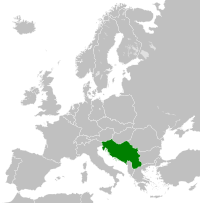Telephone numbers in Yugoslavia
 Location of Yugoslavia | |
| Location | |
|---|---|
| Country | Yugoslavia |
| Continent | Europe |
| Type | Open |
| Format | (0xx) xx xxxx (0xxx) xxxxx (0xxx) xx xxxx |
| Access codes | |
| Country code | +38 |
| International access | 99 |
| Long-distance | 0 |
Telephone numbers in Yugoslavia consisted of a 3-digit area code followed by 6 digits. In Serbia, they mainly began with 1, 2 or 3, in Croatia 4 or 5, in Slovenia 6, Bosnia and Herzegovina 7, in Montenegro 8 and in North Macedonia 9.
Yugoslavia's country calling code was +38. On 1 October 1993, the +38 code was broken up and the first digit of each area code integrated into each country's new country code (for example, Slovenia's country code became +386). The numbers were also changed in some countries. For example, Skopje's call prefix 091 became 02, so (091) 12 3456 became (02) 12 3456, and later (02) 312 3456.
Serbia and Montenegro, however, shared the +381 code until 2006, when Montenegro became independent and was assigned the +382 code. The +388 code was not used by Montenegro, but for the European Telephony Numbering Space. The +380 code was assigned to Ukraine. After negotiations, in 2015 the +383 code was assigned to Kosovo, which until then had used Serbian, Monegasque (+377) and Slovenian telephone networks. The +384 code remains unassigned.
Exchange codes could not begin 0 or 9 due to the trunk prefix and emergency numbers, respectively. Since most of the new systems have changed their emergency number to the European standard of 112 and changed their international call prefix to 00, nowadays exchange codes cannot begin 0 or 1.
Area codes
[edit]- 70 - Jajce
- 71 - Sarajevo
- 72 - Zenica
- 73 - Goražde
- 74 - Doboj
- 75 - Tuzla
- 76 - Brčko
- 77 - Bihać
- 78 - Banja Luka
- 79 - Prijedor
- 80 - Livno
- 88 - Mostar
- 89 - Trebinje
- 40 - Čakovec
- 41 - Zagreb
- 42 - Varaždin
- 43 - Bjelovar
- 44 - Sisak
- 47 - Karlovac
- 48 - Koprivnica
- 49 - Krapina
- 50 - Dubrovnik
- 51 - Rijeka
- 52 - Pula
- 53 - Gospić
- 54 - Osijek
- 55 - Slavonski Brod
- 56 - Vinkovci
- 560 - Našice
- 57 - Zadar
- 58 - Split
- 59 - Šibenik
- 901 - Kumanovo, Kratovo, Kriva Palanka
- 902 - Radoviš, Strumica, Valandovo
- 903 - Kočani
- 904 - Strumica
- 91 - Skopje
- 92 - Probištip, Štip, Sveti Nikole
- 93 - Gevgelija, Titov Veles
- 94 - Gostivar
- 95 - Kičevo
- 96 - Struga, Resen, Ohrid, Debar
- 97 - Demir Hisar, Bitola
- 98 - Prilep, Kruševo
- 81 - Titograd, Danilovgrad, Kolašin
- 82 - Kotor, Tivat
- 83 - Nikšić, Plužine, Šavnik
- 84 - Bijelo Polje, Mojkovac
- 85 - Bar, Ulcinj
- 86 - Budva, Cetinje
- 871 - Andrijevica, Ivangrad, Plav, Rožaje
- 872 - Pljevlja, Žabljak
- 88 - Herceg Novi
- 10 - Pirot
- 11 - Belgrade
- 12 - Požarevac
- 14 - Valjevo
- 15 - Šabac
- 16 - Leskovac
- 17 - Vranje
- 18 - Niš
- 19 - Zaječar
- 20 - Novi Pazar
- 26 - Smederevo
- 27 - Prokuplje
- 30 - Bor
- 31 - Titovo Užice
- 32 - Čačak
- 33 - Prijepolje
- 34 - Kragujevac
- 35 - Jagodina
- 36 - Kraljevo
- 37 - Kruševac
- 13 - Vršac
- 21 - Novi Sad
- 22 - Sremska Mitrovica
- 23 - Zrenjanin
- 230 - Kikinda
- 24 - Subotica
- 25 - Sombor
- 28 - Titova Mitrovica, Leposavić, Vučitrn, Srbica, Zvečan, Zubin Potok, North Mitrovica
- 280 - Gnjilane, Vitina, Kosovska Kamenica, Parteš, Ranilug, Klokot
- 29 - Prizren, Suva Reka, Dragaš, Mamuša, Mališevo
- 290 - Uroševac, Đeneral Janković, Kačanik, Štrpce, Štimlje
- 38 - Priština, Glogovac, Gračanica, Kosovo Polje, Lipljan, Novo Brdo, Obilić, Podujevo
- 39 - Peć, Istok, Klina
- 390 - Đakovica, Dečani, Junik, Orahovac
- 61 - Ljubljana
- 601 - Trbovlje
- 62 - Maribor
- 602 - Ravne na Koroškem
- 63 - Celje
- 64 - Gorenjska (Kranj)
- 65 - Nova Gorica
- 66 - Koper
- 67 - Postojna
- 68 - Novo Mesto
- 608 - Krško
- 69 - Prekmurje (Murska Sobota)
Emergency/other numbers
[edit]- 92 - police
- 93 - fire
- 94 - ambulance
- 95 - speaking clock
- 985 - civil protection
- 987 - AMSJ
- 99 - international call prefix
